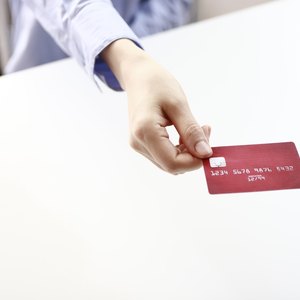
A merchant can't legally charge your credit card without your permission, but this doesn't necessarily mean the merchant has to get an authorization form for every charge. There are several ways to get a customer's permission, and your signature is frequently sufficient authorization. Some businesses even rely on one-time authorizations for recurring charges.
Signature Verification
Although some merchants request photo identification, there's no law requiring them to do so. Instead, merchants need to verify that you signed the card, and some credit cards – such as Visa and MasterCard – require merchants to accept cards without identification. The signature on the back of your card serves as authorization, and the signed signature slip allows the merchant to compare the signed card to the signed slip.
Credit Card Charge Authorization Forms
When you pay over the phone or use someone else's credit card with their permission such as when a child uses her parent's card to pay for a dentist appointment, the merchant needs the card holder's express permission. Most merchants use authorization forms, upon which the cardholder lists the authorized amount and date, alongside a signature.
Online Purchases
When you make a purchase online, you don't have to sign an authorization form. Instead, entering your information and consenting to the purchase constitutes authorization. Some merchants that are concerned about credit card fraud and chargebacks use third-party verification services, such as Verified by Visa, for online credit card transactions. If the merchant requires such a service, you won't be able to make a purchase until you've been verified.
One-Time Authorization
Businesses don't necessarily have to get authorization for each individual purchase. Some businesses set up auto-drafts for recurring services such as gym memberships and subscriptions. You'll sign an authorization form granting permission to the business to charge your card on a recurring basis. You'll then be charged on the date listed on the agreement you signed until you cancel the membership or subscription.
Unauthorized Charges
If a merchant charges your credit card without your express permission, you'll generally have to take the issue up with the business first. If the business is unwilling to remove the charge, you can initiate a dispute with your card company. The business will have a chance to respond to your dispute. If you can provide sufficient evidence that the charge was not authorized, your card company will refund the money. Merchants that have too many credit card disputes can lose their ability to accept credit card payments, so the threat of a dispute may inspire a merchant to give you a refund.
References
Writer Bio
Van Thompson is an attorney and writer. A former martial arts instructor, he holds bachelor's degrees in music and computer science from Westchester University, and a juris doctor from Georgia State University. He is the recipient of numerous writing awards, including a 2009 CALI Legal Writing Award.

